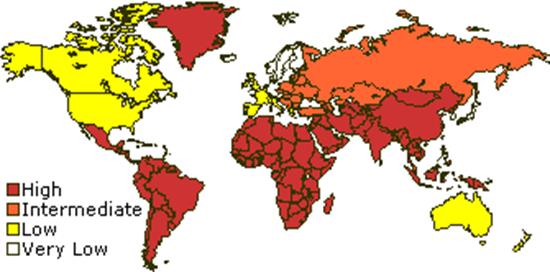Топик: Hepatitis A Prevention
CONTENTS:
|
Hepatitis A is a liver disease caused by the hepatitis A virus (HAV). Hepatitis A can affect anyone. In the United States, hepatitis A can occur in situations ranging from isolated cases of disease to widespread epidemics. Good personal hygiene and proper sanitation can help prevent hepatitis A. Vaccine are also available for long-term prevention of hepatitis A virus infection in persons 2 years of age and older. Immune globulin is available for short-term prevention in all ages. |
How do you get hepatitis A?
Hepatitis A virus (HAV) is found in the stool of persons with hepatitis A. HAV is usually spread from person to person by putting something in the mouth that had been contaminated with the stool of a person with hepatitis A. For this reason, the virus is more easily spread in areas where there are poor sanitary conditions or where personal hygiene is not observed.
Persons with hepatitis A can spread the virus to others who live in the same household or with whom they have sexual contact. Casual contact as in the usual office, factory, or school setting does not spread the virus.
Who is at risk for hepatitis A?
- Persons who share a household or have sex contact with someone who has the hepatitis A
- Travelers to countries where hepatitis A is common and where clean water and proper sewage disposal are not available
- Men who have sex with men
- Persons who use street drugs
- Children and employees in child care centers (especially centers that have children in diapers) where a child or employee has hepatitis A
- Residents and staff of institutions for developmentally disabled persons when a resident or employee has hepatitis A
- Workers who handle HAV-infected animals or work with HAV in a research laboratory setting. (This does not include laboratories doing routine testing.)
- Persons with clotting factor disorders who receive clotting factor concentrates
How do you know if you have hepatitis A?
Three of every four adults who get hepatitis A have symptoms that usually develop over a period of several days. Children who are infected often have no symptoms.
If you have symptoms
- your eyes may turn yellow and you may have dark urine
- you may be tired
- you may lose your appetite
- you may have nausea, vomiting, fever, or stomach ache
A person can spread HAV about one week before symptoms appear and during the first week of symptoms. Persons with no symptoms can still spread the virus. This often happens with young children who unknowingly spread HAV to older children and adults.
Unlike hepatitis B and hepatitis C, hepatitis A causes no long-term liver damage and usually does not cause death. There is no chronic carrier state with hepatitis A. Having had the disease produces life-long immunity from future HAV infection.
How can you prevent hepatitis A?
|
You should always wash your hands after using the bathroom, changing a diaper, and before eating or preparing food. Hepatitis A vaccines provide long-term protection against hepatitis A and are licensed for use in persons 2 years of age and older . |
Children and adults need two shots of hepatitis A vaccine for long-term protection. Your doctor or nurse will tell you when to return for the second shot.
Immune globulin, a preparation of antibodies, is recommended for short-term protection against hepatitis A and for persons who have already been exposed to HAV. Immune globulin must be given within two weeks of exposure to HAV for maximum protection.
Who should receive hepatitis A vaccine?
- Persons who work in or travel to areas where hepatitis A is common. (first dose should be given at least 4 weeks before travel)
- Children in states and countries with constant increased rates of hepatitis A. County and state health departments can tell you whether your areas have these higher hepatitis A rates.
- Men who have sex with men
- Persons who use street drugs
- Persons with clotting factor disorders, such as hemophilia
- Persons who work with HAV-infected animals or work with HAV in a research setting (hepatitis A vaccine is not generally recommended for health care workers).
Can you get hepatitis A from food or water?
|
In addition to getting hepatitis A directly from infected people, you can get hepatitis A by:
|
Can HAV be killed?
The virus is killed by boiling at 85 degrees C (185 degrees F) for 1 minute. However, the disease can still be spread by cooked foods if they are contaminated after cooking. Adequate chlorination of water, as recommended in the United States, kills HAV.

The material has been taken from http://www.cdc.gov/ncidod/diseases/hepatitis/resource/a_prevent.htm